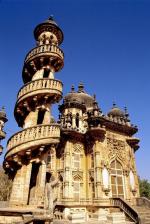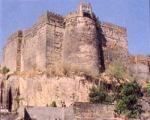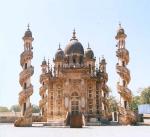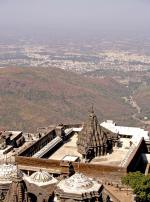If Porbandar is the city of Sudama, Junagadh is the city of Narsimh Mehta, the saint poet of Gujarat. Although Narsimh was born at Talaja near Bhavnagar, he spent his whole life at Junagadh. This is one of the most ancient places of Indian history. The first historical reference in the Junagadh Inscription of Ashoka is that of Chandragupta Maurya (322-298 BC). As the Inscription says, the assistant of Chandragupta, Vaisya Pushyamitra had constructed a dam over the Suvarnaskta River and created this manmade lake named 'Sudarshan' here. Thereafter, Ashok rebuilt and renovated this lake circa 150 BC.
In the first century of Christ the Ksatrap kings had been ruling for the last 400 years, as tributary rulers of the Mauryas. Then came the Maitraka dynasty, established by one Bhattaraka. The Arabs brought an end to this dynasty. The region was then ruled by Chudasamas of Yadava descent until 1472 AD. Then the Mughals occupied entire Gujarat region, and after them the regional Muslim rulers or Sultans took over.
Girnar A lofty Mountain: At its base is the city of Junagadh, meaning Old Fort. This is not just a historical site but also ancient - most ancient - site of the Puranas. When we explore its recent history, we find the story of its Nawab who did not want to join the Indian Union after Independence. As we move back in time we go through not just the Chudasamas and Mauryas, but all the way to Satrap Rudradaman and Lord Krishna because of its antiquity. We can still find the marks of Time on its various places such as the stories of Bhairav Nath and Gorakh Nath, Buddhist caves, Inscriptions of Ashoka and Rudradaman, Jain temples with its stories interwoven in Jain 'Rasas', the 'Choro' of Narsimh Mehta and Damodar Kund, Navgahn Kuvo,Uparkot, 'Chhatris' of the Nawabs, are left here that we can recognize and recall.
Another such popular legend is that of Ra Gangajaliya. The last Rajput ruler of Junadagh was Ra Mandalik. He was named Ra Gangajaliya for his good character and purity. But once he fell in love with one of his subjects, a woman of great character, Nagbai, and she cursed him. As a result Muhammad Begda was able to defeat this brave ruler, and from then on Junagadh came under Muslim rule.
The town of Junagadh offers a lot to the tourist. The Uperkot Fort, its Gates, the ruins of the palace of Ra Khengar, the nalTOW'vav' of Adikadi and the Navghan Kuvo built similar to the Bhammariyo Kuvo; of Mahemeadabad with their amazing architecture are also worth seeing. These are of 10th century. The town also has the 'Chhatris' or bmial places of the Babi dynasty's scions. The zoo is called 'Shakkm"bag', then a palace built in 19th century too needs to be visited. However, the ancient memories can be revived on the way to Girnar.
Tuesday, October 18, 2011
Junagadh
Junagadh
Subscribe to:
Post Comments (Atom)






No comments:
Post a Comment